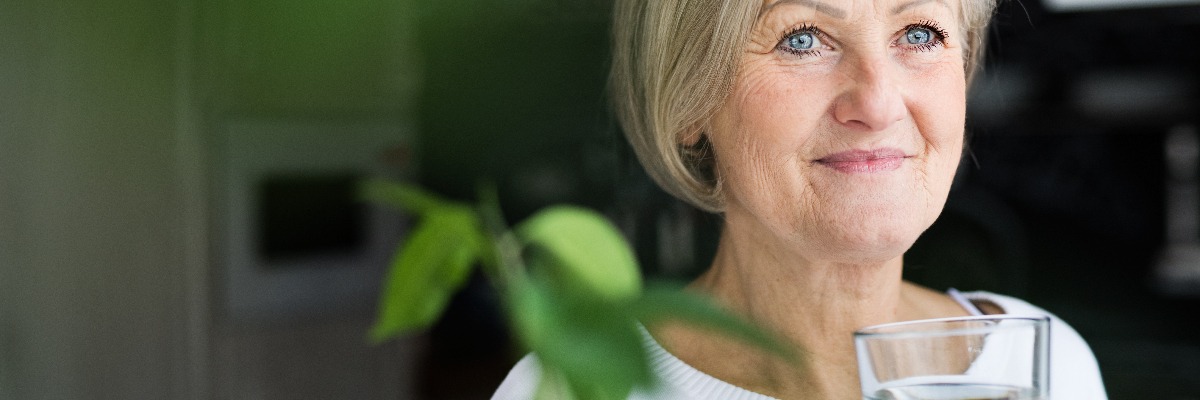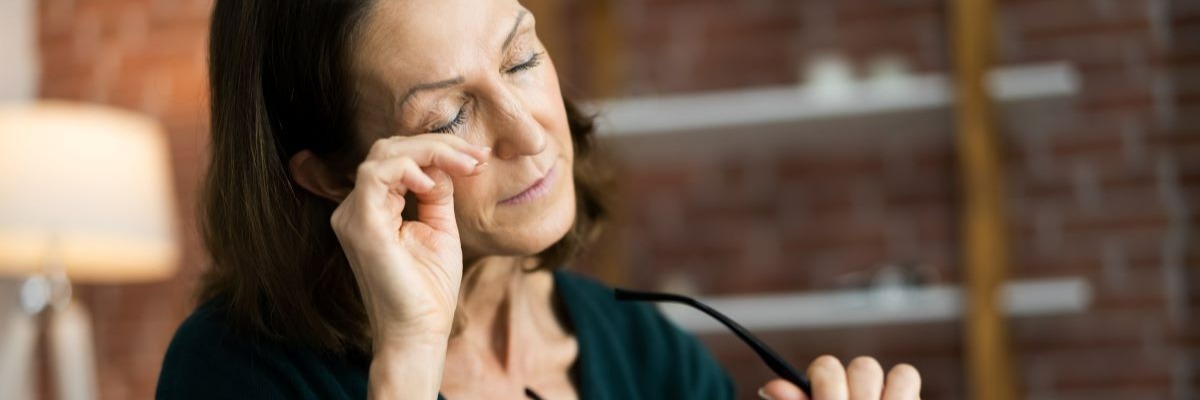Dry Eye and Menopause: What’s the Link?
During menopause, have you noticed that you’re struggling more with your vision or experiencing a lot of discomfort around your eyes? Don’t worry, you’re not the only one. In fact, there’s a link between menopause and Dry Eye disease.
Some studies suggest that around 61% of perimenopausal and menopausal women are affected by Dry Eye syndrome [1] , while a survey of 6,000 women revealed that one in four women said they experienced dry eyes, making it the second most common hidden menopause symptom. [2]

What is Dry Eye?
Dry Eye syndrome is an extremely common eye condition affecting one in four people in the UK. [3] When your tears aren’t able to provide adequate lubrication for your eyes, you may notice inflammation in the eye which is related to a wide range of symptoms. You may experience red eyes, itching, a burning sensation, sensitivity to light, and even fatigue. Symptoms are wide-ranging, so if you’re experiencing discomfort and irritation in your eyes, it may be Dry Eye. [4]
Why Dry Eye?
There are several reasons you might start to show symptoms of Dry Eye disease. From smoking to aging, there are a lot of factors to consider but one you may not have thought about is your hormone levels.
During menopause your androgen hormones (which include testosterone) decrease. This hormone change affects the meibomian and lacrimal glands in the eyelids that provide the essential oils for tears. Tears moisten the eyes so you will see increased tear evaporation and drier eyes as a result.
Recent research shows that testosterone helps to manage the balance of tear production which you need to lubricate your eye. Without enough tear film, you may end up feeling an itchy, gritty, or stinging sensation – otherwise known as Dry Eye.
There is also some evidence that estrogen levels changing during this phase can also lead to Dry Eye disease. More research needs to be done to solidify this link but it would explain the increase in Dry Eye symptoms at different points of a woman’s monthly fertility cycle. [5]
One thing that’s clear, however, is that dry eyes can be a result of a sex hormone deficiency, meaning it’s a common side effect of menopause, when your hormone levels will drop.

Is Dry Eye Disease a Common Menopause Symptom?
That gritty feeling in your eyes might make you feel like you’re all alone but don’t worry. Many people deal with Dry Eye disease every day and during menopause, it’s a very common symptom.
Menopausal symptoms vary depending on the person and their age, so you could end up facing very different symptoms and experiences from your friends. However, if you are noticing redder eyes, blurred vision, and excessive tearing then you might be dealing with hormonally-induced Dry Eye disease.
How do Hormones Play a Role?
During perimenopause and menopause, there’s a variety of changes in hormones that can be related to dry eye symptoms. We see a decrease in both estrogen and testosterone. Sex hormones are incredibly important to keep the ocular surface of the eye stable, which means they’ll affect producing tears, evaporating tears, draining tears, maintaining nerves behind the cornea, and maintaining the immune system of the eye. When it comes to Dry Eye the ability to keep the eyes moist (usually by tears) plays a large role. When the eyelid becomes dry and irritated , it causes pain, a burning sensation, and red eyes. [6]
During perimenopause, your sex hormone levels begin to drop and eventually, you’ll find you no longer have periods (the process we call the menopause).
After this your body entirely stops making progesterone and the production of estrogen and androgens decreases at a quicker rate, which is why we see the onset of these symptoms around this period of a woman’s life. [7]
Higher Risk Factors
One thing of note is that women who experience premature or early menopause (when the final menstrual period happens before the age of forty) are more at risk for androgen deficiency. [8]
Additionally, it may be worth considering the increased risk factor if you’ve been on estrogen tablets or the pill, have had surgical removal of the ovaries, or have suffered from an eating disorder that’s placed stress on the body. You can get tested for this deficiency, however, due to the levels naturally being so low in women, it’s difficult to do so.
If you’re looking into testing your levels to work out the cause of your Dry Eye disease then make sure you get your blood taken in the morning when testosterone levels are at their highest.
Hormone Replacement Therapy and Dry Eye Disease
Most doctors would recommend hormone replacement therapy (HRT) for alleviating particularly troublesome symptoms of menopause. Traditionally HRT replaces estrogen and progesterone which will fall during this period of a woman’s life. [9] However, HRT usually treats hot flashes, mood swings, and sleep issues rather than Dry Eye disease. You may be considering this treatment to soothe your dry eyes but unfortunately, research hasn’t yet proven the benefits of it.
While some studies show a small amount of improvement in the alleviation of symptoms, the largest cross-sectional study to date found that long-term use of HRT increases the risk of Dry Eye symptoms. Essentially the longer women stayed on hormone replacement therapy the worse and more frequent their Dry Eye symptoms became. [10]
So even if you were only experiencing mild Dry Eye symptoms during perimenopause, you may find that once you start treatment, you experience the onset of Dry Eye disease.

Treating Dry Eye During Menopause
With the effects of HRT in mind, it’s important to consider how your treatments of Dry Eye symptoms will impact your treatment of other menopausal symptoms, and visa versa. HRT can help alleviate some menopausal symptoms but research shows that the treatment can make Dry Eye Disease worse.
However, many usual recommendations for Dry Eye are lifestyle suggestions that may boost your overall health. Eating well, drinking enough water, and getting enough sleep can all help battle that dry, itchy feeling while decreasing screen time can boost your mood as well!
If you’re usually a fan of contact lenses, make sure you’re also grabbing those glasses every now and then to give your eyes a break. Hydrating eye drops in the mornings and evening can help soothe your eyes, and make sure you’re limiting stress where you can. [11]
If your dry eyes are chronic or causing large problems in your life the VISUshop site has a wide range of products for treatment and prevention you can check out here .
For more information on Dry Eye and Menopause, take a look at our other blogs on the subject, and what you can do to alleviate your dry, itchy eyes.
References
- ‘What’s the Link between Dry Eye and Menopause?’ Dryeyecare.net, 08/04/21, Last Accessed January 2024
- ‘Dry Eyes and Menopause Demystified’, Balance by Newson Health, 24/06/23, Last Accessed January 2024
- ‘Dry Eye Syndrome’, Association of Optometrists, Last Accessed January 2024
- ‘Dry Eye Symptoms’, Dry Eye and Me, Last Accessed January 2024
- Lazarus, Russel, ‘Dry Eye and Menopause’, Optometrists.org, 09/09/2020, Last Accessed January 2024
- Millar, Helen, ‘Dry Eyes and Menopause: What to Know’, Medical News Today, 18/09/23, Last Accessed January 2024
- ‘The Link Between Menopause and Dry Eye’, Slingsby & Huot Eye Associates, Last Accessed January 2024
- ‘Androgen Deficiency in Women’, Better Health Channel, Last Accessed January 2024
- ‘About Hormone Replacement Therapy (HRT)’, NHS, Accessed January 2024
- Osborn, Corrinne, ‘Menopause and Dry Eyes: What’s the Link?’, Healthline, Last Accessed January 2024
- ‘Dry Eyes: The Unexpected Symptom of Perimenopause and Menopause’, The Latte Lounge, 26/09/22, Last Accessed January 2024




